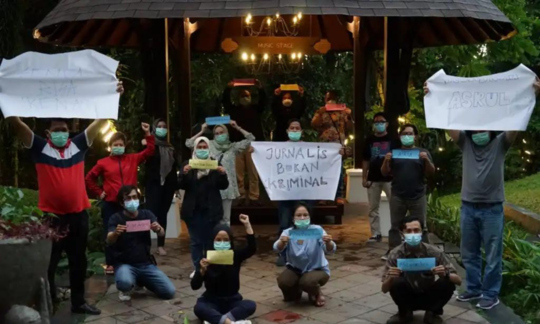Palopo-based journalist Muhammad Asrul was sentenced to 3 months prison after a court in Palopo found that he had violated Articles 27 and 45 of the ITE Law. The charges, which were filed on 17 December 2019, followed an in-depth investigation by Asrul of allegations of corruption by the son of the Palopo mayor.
Criminalising critical journalism
Asrul published three articles about the Palopo mayor’s son entitled "Crown Prince Palopo Allegedly "Mastermind" Corruption PLTMH and Chips Zaro Rp11 billion", dated 10 May 2019; ”The smell of corruption in the revitalization of the Palopo Pancasila field allegedly dragged away by Farid Judas" dated 24 May 2019; and ”Volume II Corruption of the Rp5 billion West Ring Road, the Investigator's Signal for Farid Judas?" dated May 25, 2019.
The articles sought to draw public attention to important allegations of public corruption.
On 29 January 2020 Asrul found himself summoned by police and he was taken to the South Sulawesi Police headquarters. He was not accompanied by any legal counsel at that time and was questioned and detained at the South Sulawesi Police headquarters lock-up from 30 January to 5 March 2020. The prospect of detention before trial under the ITE law was one of the substantial grounds of objection to the original ITE law raised by Indonesian civil society groups.
Asrul only managed to obtain his release from police custody after getting help from the Indonesian Press Council. The Press Council wrote to police stating that it proposed to resolve this issue in accordance with Law (Number 40 of 1999) on the Press and the Memorandum of Understanding between the Press Council and the police (No.2/DP/MoU/II/2018 and No.B/5/II/2017) on the protection of freedom of the press concerning complaints against the press.
Bypassing official mechanisms
The Press Council duly considered the complaint under the MOU, and concluded that the news articles written by Asrul were legitimate journalistic products, and should not have been the subject of criminal charges. Notwithstanding this, the Palopo District Court disregarded the Press Council ruling, the trial continued, and Asrul was convicted and sentenced to prison on 23 November. It was cold comfort that the Court only imposed a 3 month sentence when prosecutors pushed for 12!
This prosecution is regarded as extremely troubling because the Court has disregarded the previously accepted role of the Press Council as being the arbiter of press complaints.
A system subject to intrepretation
The provisions of the ITE law have long been criticised as failing to set out a clear legal standard against which so called ‘defamation’ provisions can be measured. The ITE law has long been derided by press freedom group as imposing ‘rubber - articles’ which can have a chilling effect on publication. Responding to this decision, Amnesty International Indonesia stated: ‘The application of the rubber articles by law enforcement officers to Asrul further shows that the ITE Law can be used by people in power to imprison anyone.’
Concern about the deteriorating state of press freedom in Indonesia led to the formation of the Committee for the Safety of Journalists which was established in Jakarta, on April 5, 2019. This is a coalition of press and civil society organizations consisting of AJI Indonesia [Aliansi Jurnalis Independen], LBH Pers, Amnesty International Indonesia, YLBHI, SAFEnet, IJTI, AMSI, SINDIKASI, PWI and FSPMI. The coalition is supporting an appeal to the Makassar High Court by Asrul.
Jim Nolan is the International Federation of Journalists’ pro-bono legal expert in the Asia Pacific.

